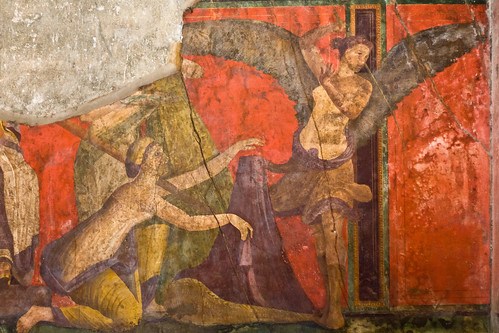
Colossians 2:18 ups the stakes involved in the Colossian
problem in a number of ways. First, we move past 2:16’s ‘pass judgment’ (κρίνω/krinō) to ‘disqualify’ (καταβραβεύω/katabrabeuō).
Where the former suggests criticism, perhaps condemnation, the latter suggests
full dismissal, the equivalent of being kicked out of the game by an umpire. Imagine, a referee roaming the aisles of your
church building, watching for how you worship, and blowing a whistle and
throwing a flag if you are not pious enough, not rigorous enough, if you don’t
achieve the proper emotional and intellectual pitch in your devotions. Until
finally, he (or she) screams “You’re out of here!” and kicks you out of the service.
(With my singing alone, I’d be permanently benched.)
The troublemakers appear to be doing something like this
and, making matters worse, their standards are unusually lofty (literally), as
connoted by the phrase “worship of angels.” The phrase is ambiguous (in both
Greek and English): it may refer to angels as the objects of worship or it may
refer to the worship angels are engaged in. “Humility” also is problematic; usually
for Christians it’s a good thing (Col 3:12) but here and in 2:23 it is
negatively associated with the troublemakers. And while English translations usually take humility
as standing by itself in this verse, others (like Sumney) understand it to go
with next phrase (so, it would mean the humility and the worship, both engaged
in by the angels).
Unfortunately the next phrase (“obsessing over visions,”
literally “which things having seen upon entering”) is even more ambiguous. There
is some evidence that the word I’ve translated “obsessing” has to do with visionary
experiences in mystery religions, but I think the NRSV’s “dwelling upon visions”
or the NIV’s “goes into great detail about what they have seen” gets at the gist
of it.
Whew, what a mess. Paul’s view of it all is easy to
understand - the people fixated on such things have become arrogant for no
reason as a result of their “fleshly mind” (his point being that those who take
pride in their heavenly worship experiences could not be more this-worldly).
In a nutshell, I think today’s passage, and 2:16, should be
taken to mean that by observing special diets and holy days, the Colossians are
expected to not only appease the heavenly forces that dog their earthly
existence but to reach superhuman heights in their worship experience, coming
alongside these same forces by means of self-humiliation and worship usually
only angels are capable of. (Don’t katabrabeuō me b/c I ended the last sentence with a preposition). The troublemakers ‘encourage’ this worship by boasting
about their own success, recounting every detail of the visions they themselves
have achieved. If the Colossians do not have precisely this experience, the
troublemakers dismiss them as unspiritual and so incapable of ‘dealing’ with
the rulers and authorities.
I am relieved that we do not inhabit the world of
Colossians. Fortunately for us, our worship is a place where there is no
judgment, I mean, where no one judges people today on the quality of their
worship and whether a body of believers attains the ‘right’ spiritual, emotional
or intellectual level. No one stands over fellow believers, yellow flag in hand
and whistle in mouth, ready to call foul when someone misses a beat or adds a
step or in some way renders less than adequate worship. Thankfully, there is no pressure on worship
leaders to innovate and coordinate services that result in consistently word-of-mouth
worthy experiences. And it is a sign that we’ve evolved religiously, that no
one now is tempted toward self-confidence and arrogance over how well they
worship.
Come to think of it, I’m not sure why I bothered with this
post. Anyway, I’ll try to make up for it in tomorrow’s post when I talk about
your body.
.jpg)
1 comment:
We have, indeed, restored New Testament Christianity!
Post a Comment